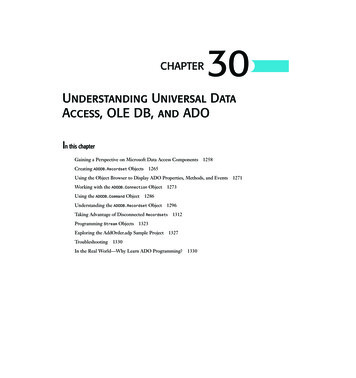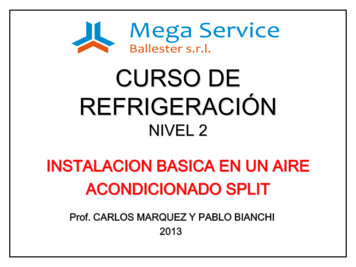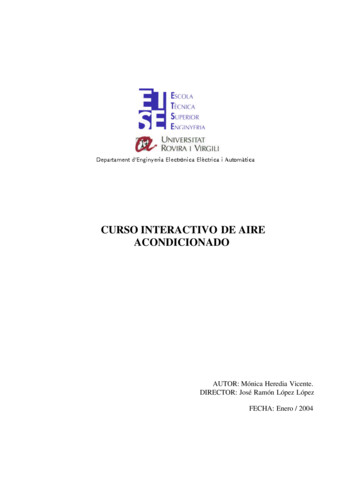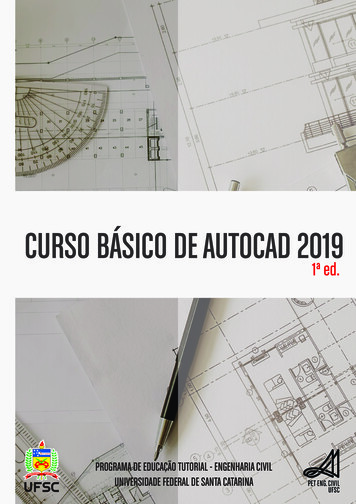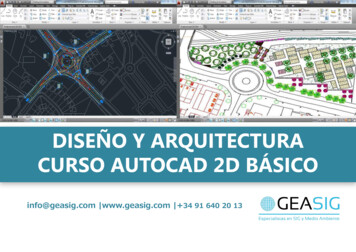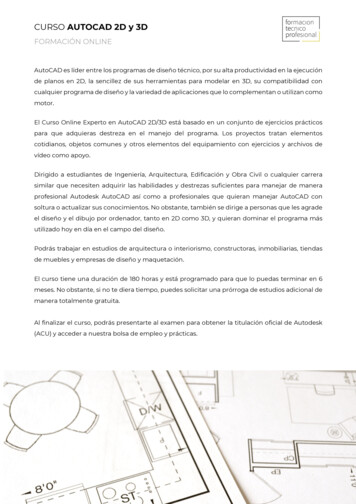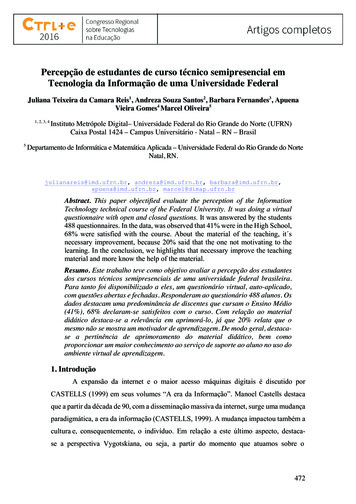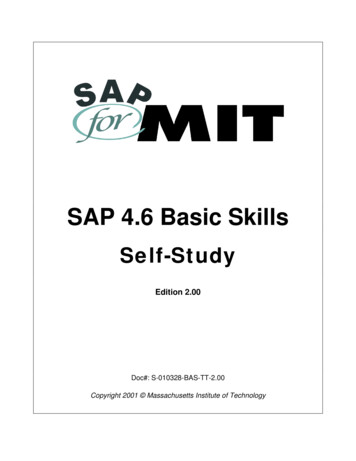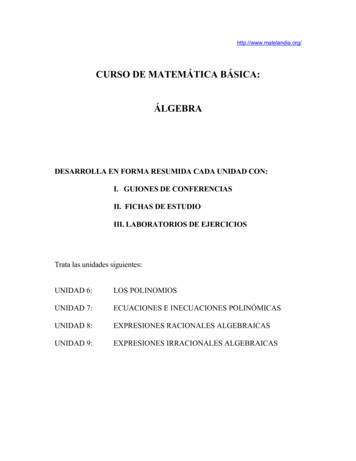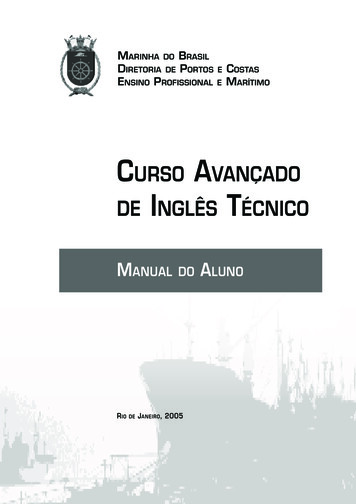
Transcription
MARINHA DO BRASILDIRETORIA DE PORTOSENSINO PROFISSIONALEECOSTASMARÍTIMOCURSO AVANÇADODE INGLÊS TÉCNICOMANUALR IODEDOJ ANEIRO , 2005ALUNO
Colaboração: OGMO - Paranaguá (Francisco José Rodrigues)OGMO - Recife (Mariana de Albuquerque Braga)OGMO - Rio GrandeElaboração dos conteúdos: Erika CoachmanProjeto gráfico: Rodolpho Oliva 2005 direitos reservados à Diretoria de Portos e CostasDiretoria de Portos e CostasRua Teófilo Otoni, nº 4 - CentroRio de Janeiro - RJ20090-000http://www.dpc.mar.mil.br
CURSO AVANÇADODE I NGLÊSTÉCNICOLesson OneIn this lesson you are going to learn:The verbs to lift, to lower, to use,to put, to replace, to charter, tostore, to containerizeTypes of shipsDocuments papersSimple Past
4CURSO AVANÇADO DE INGLÊS TÉCNICO - LESSON ONEVERBSto lift, lifted (levantar)to lower, lowered (abaixar)to use, used (usar)to put, put (colocar)to replace, replaced (substituir)to charter, chartered (fretar)to load (carregar, no sentido de abastecer)to carry (carregar, no sentido de transportar)to store (armazenar, estocar)to containerize (acomodar mercadorias em container)New VocabularyVocabularocabularyfreight (frete)Types of Shipsvessel ship (navio )chemical tanker ( navio-tanque, paraaboard (a bordo)transporte de produtos químicos)charterer (fretador )bulk carrier (graneleiro, tipo de naviochemical product (produto químico)especializado no transporte de carga a granel)harbour (porto)support ship (navio de suporte, ajuda)sea (mar)supply ship (navio de suprimentos)bay (baía)chartered vessel ( navio fretado )river (rio)container ship (navio de transporte dewarehouse (armazém)containers)dock quay (cais, embarcadouro)passengers ship (navio de passageiros )stacking machine (empilhadeira )PapersBill of lading (Conhecimento de embarque –abreviatura: B/L)Cargo manifest (Relação de cargas/Manifestode carga)
CURSO AVANÇADO DE INGLÊS TÉCNICO - LESSON ONE5ExpressionsOn (ligado) To turn on to switch on (ligar)Off (desligado) To turn off to switch off ( desligar)To pile up (empilhar)Grammar PointsThe Japanese company chartered twenty vessels.Did the Japanese company charter twenty vessels?No, the Japanese company didn’t charter twenty vessels.The British company chartered twenty vessels.The crane driver lifted the cargo two minutes ago.Did the crane driver lift the cargo two minutes ago?No, the crane driver didn’t lift the cargo two minutes ago.He ifted the cargo two hours ago.The electric drill was on yesterday.Was the electric drill on yesterday?The electric wasn’t on yesterday. It was off.Verb to beIt is – It wasI am – I wasWe are – We wereYou are – You wereYou are – You wereHe is – He wasThey are – They wereShe is – She asExcuse me. May I see your Cargo Manifest?OK.May I see your Bill of Lading?Ok.What s your first port of call in Brazil?Recife.What s your last?Santos.What s your final destination?Buenos Aires.The “Bill of Lading”and “Cargo Manifest”are important papersto receive and shipany kind of cargo.
6CURSO AVANÇADO DE INGLÊS TÉCNICO - LESSON ONEExercises1.Change the sentences into the negative and interrogative:a) Captain Johnson was a good worker.NIb) The crane drivers were very busy during the morning.NIc) The master worked a lot yesterday morning.NId) The agent was aboard.NIe) The officer put some papers on the table.NI2.Describe what you did yesterday.
CURSO AVANÇADO DE INGLÊS TÉCNICO - LESSON ONECURSO AVANÇADO7DE I NGLÊSTÉCNICOLesson TwoIn this lesson you are going to learn:The verbs to talk, to meet, to leave,to arrive, to ask, to answerVocabulary related to customsand cargoVocabulary related to commercialbusiness
8CURSO AVANÇADO DE INGLÊS TÉCNICO - LESSON TWOVERBSTo pay, paidto buy, bought (comprar)to change, changed (trocar)to sell, sold (vender)to deal, dealt (negociar)to lend (emprestar)to borrow (tomar emprestado)to agree, agreed (concordar)to meet, met (encontrar)to leave, left (sair, deixar)to arrive, arrived (chegar)to return, returned (regressar)to ask, asked (perguntar, pedir)to answer, answered (responder)New VocabularyVocabularocabularyTypes of CargoCustomshazardous cargo, dangerous cargo (carga perigosa)customs (alfândega)dry cargo (carga seca – não líquida ou gasosa)customs officer (oficial dabagged cargo (carga embalada em sacos)alfândega)fragile cargo (carga frágil)tax (imposto)inflammable cargo (carga inflamável)fine (multa)Businessextra fee (taxa extra)sale (venda)deal (negócio fechado )exchange (câmbio)agreement (acordo)price (preço)loan (empréstimo)expensive (caro )interests (juros)insurance (seguro)cheap ( barato)ExpressionsHigh tide (maré alta)Ebb tide (maré baixa )Beware of (Seja cuidadoso, cuidado com)Go away (ir embora )Go back (voltar)Come back (vir de volta)
CURSO AVANÇADO DE INGLÊS TÉCNICO- LESSON TWOGrammar PointsThe charterer paid an extra fee, so the product was too expensive.The charterer didn’t pay an extra fee, so the price was low.Did the charterer pay an extra fee? No, he didn’t.The crane driver lifted the hazardous cargo carefully.The crane driver didn’t lift the hazardous cargo carefully.Did the crane driver lift the hazardous cargo carefully?The master was asking important questions.The master wasn’t asking important questions.Was the master asking important questions?Exercises1.Put the sentences in the past form.Make the necessary changes:a) The stevedore is helping the master now.b) The charterer paid an expensive fine.c) The TV is on all night long.d) The captain answered my questions.e) The stevedores work a lot every day.9
10CURSO AVANÇADO DE INGLÊS TÉCNICO - LESSON TWO2.Ask questions for the answers below:(use when , where, what, or who)a)The duty officer helped the agent.b)The tally clerk is on deck.c)The winch man locked the door last night.d)I help the master when he needs help.3.Write a short paragraph describing what you were doing beforeyou came to class:
CURSO AVANÇADO DE INGLÊS TÉCNICO- LESSON TWOCURSO AVANÇADO11DE I NGLÊSTÉCNICOLesson ThreeIn this lesson you are going to learn:Some new verbs: to charge, to take,to bring, to order, to deliverThe possessive case
12CURSO AVANÇADO DE INGLÊS TÉCNICO - LESSON THREEVERBSto charge, charged (cobrar)to take, took (levar)to bring, brought (trazer)to order, ordered (ordenar, encomendar)to deliver, delivered (entregar)New VocabularyVocabularocabularydelivery (encomenda )empty (vazio)charge (cobrança)full (cheio)payment (pagamento)shallow water (água rasa )order (encomenda, ordem)deep water (água profunda )mail-order (encomenda por correio)salt water (água salgada)fuel (combustível)fresh water (água doce)tank (tanque)overloaded (sobrecarregado)ExpressionsTo work overtime (fazer hora extra)It’s upside down ( está de cabeça para baixo)It’s fragile (é frágil)Be careful! (seja cuidadoso )
CURSO AVANÇADO DE INGLÊS TÉCNICO - LESSON THREEGrammar PointsThe vessel was overloaded.The vessel wasn’t overloaded.Was the vessel overloaded?The company charged an additional fee.The company didn’t charge an additional fee.Did the company charge an extra-fee?Possessive CaseThe captain’s cabin is small. ( A cabine do capitão é pequena).Jack’s payment was late. (O pagamento do Jack estava atrasado).The agents’ car is full. (O carro dos agentes está cheio).Exercises1.Translate the sentences into English:a) O capataz levou a encomenda para a cabine do capitão.b) Os agentes gostam de almoçar ao meio dia.c) Eu e George trouxemos as ferramentas do David.d) Por favor, leve isso com você.e) O escritório do Anthony está molhado.f) Os navios japoneses estavam sobrecarregados.13
14CURSO AVANÇADO DE INGLÊS TÉCNICO - LESSON THREE2.Change the sentences into their negative and interrogativeforms:a) The agent charged an extra-fee from the Japanese company.NIb) The duty officers want to travel to England next year.NIc) The boss has to speak German very well.NId) They wanted to ask me some important questions.NIe) The crane drivers had to work overtime yesterday night.NIf) The chief mate can speak Italian very well.NI
CURSO AVANÇADO DE INGLÊS TÉCNICO - LESSON THREECURSO AVANÇADO15DE I NGLÊSTÉCNICOLesson FourIn this lesson you are going to learn:Some new verbs:to import, to export, to look, to seeThere is / There are – There was /There were
16CURSO AVANÇADO DE INGLÊS TÉCNICO - LESSON FOURVERBSto import, imported (importar)to export, exported (exportar)to look, looked (olhar)to see, saw (ver)New VocabularyVocabularocabularyarrival (chegada)wet (molhado)departure (saída)dry (seco)delay (atraso)collision (colisão)early (cedo, adiantado )near (perto, próximo )late (tarde, atrasado)far (longe, distante)label (rótulo, etiqueta)coast (litoral, costa)package (embalagem)crew (tripulação)ExpressionsFire! (fogo, incêndio)Look! (olhe!)Over there (lá)Over here (aqui)
CURSO AVANÇADO DE INGLÊS TÉCNICO - LESSON FOUR17Grammar PointsThe departure was delayed.The departure wasn’t delayed.Was the departure delayed?No, the departure was a little bit early.The tally clerks were early for the meeting.The tally clerks weren’t early for the meeting.Were the tally clerks early for the meeting?No, they were late for the meeting.There is one table in the office.There isn’t one table in the office.Is there one table in the office?No, there are two tables in the office.There are four crew members working on deck.There aren’t four crew members working on deck.Are there four crew members working on deck today?No, there were four crew members working on deckyesterday, but today there are seven crew membersworking on deck.There was one agent speaking with the chief mate.There wasn’t one agent speaking with the chief mate.Exercises1. Make sentences using there is/ there are / there was/ there were:a)one vessel near the harbor yesterday.b)some crew members eating potatoes now.c)seven agents in the master’s office last week.d)one crane here everyday.
18CURSO AVANÇADO DE INGLÊS TÉCNICO - LESSON FOUR3.Change the sentences into the present:a)The master took the tools to his cabin yesterday. (everyday)b)The crane driver worked last Sunday very much. (every Monday)c)The company didn’t pay the expensive fee.
CURSO AVANÇADO DE INGLÊS TÉCNICO - LESSON FOURCURSO AVANÇADO19DE I NGLÊSTÉCNICOLesson FiveIn this lesson you are going to learn:The verbs to talk, to arriveand to leaveFuture time with going toWhy / Because
20CURSO AVANÇADO DE INGLÊS TÉCNICO - LESSON FIVEVERBSto talk, talked (conversar)to leak, leaked (vazar)to arrive, arrived (chegar)to leave, left (sair, deixar)New VocabularyVocabularocabularyleak (vazamento )crane ( guindaste)bridge (ponte)hose (mangueira)container (recepiente, container)jack (macaco para erguer)container number (número do container)rope ( corda, mangueira)crew member (tripulante, abaixo dostruck (caminhão)oficiais e do capitão)before (antes )elevator (elevador)after ( depois)hook (gancho )until ( até)ExpressionsTo pick up (apanhar, buscar)How many (quantos / número de)How much (quanto / quantidade de)
CURSO AVANÇADO DE INGLÊS TÉCNICO - LESSON FIVE21Grammar PointsHow many containers are aboard?There are one hundred containers aboard.How much money are you taking with you?I am taking four thousand dollars with me.I am going to arrive at the harbor at 7 p.m.I am not going to arrive at the harbor at 7 p.m.Are you going to arrive at the harbor at 7 p.m.?What time are you going to arrive at the harbor?The chief mate is going to leave his office before noon.The chief mate isn’t going to leave his office before noon.Is the chief mate going to leave his office before noon?When is the chief mate going to leave his office?The stevedores are going to work until Friday.The stevedores aren’t going to work until Friday.Are the stevedores going to work until Friday?Why are the stevedores going to work until Friday?Because they have to.Exercises1.Make questions to the answers below, using What/When/Why/What time / Who / Where / How much / How many:a)?The chief mate has seventy dollars.b)?Because there is a lot of work to do.c)?The stevedores went to the master’s office.d)?They want to talk to the agent.
22CURSO AVANÇADO DE INGLÊS TÉCNICO - LESSON FIVEe)?She likes to go to church on Sunday.?f)There were five cranes near the harbor.
CURSO AVANÇADO DE INGLÊS TÉCNICO - LESSON FIVECURSO AVANÇADO23DE I NGLÊSTÉCNICOLesson SixIn this lesson you are going to learn:Some new verbs: to think, to observe,to guess, to do, to makeComparative and Superlative
24CURSO AVANÇADO DE INGLÊS TÉCNICO - LESSON SIXVERBSto think, thought (pensar)to observe, observed (observar)to guess, guessed (acreditar que, adivinhar)to do, did (fazer)to make, made (fazer, produzir )New VocabularyVocabularocabularyto do an exercise (um exercício)a job (um trabalho )a loan (um empréstimo )a service (um serviço)food (comida)a favor (um favor)a promise (uma promessa)business with (negócios com)money (dinheiro)ExpressionsIIIIto make friends (amigos)have an idea (eu tenho uma idéia)think so (eu acho que sim)don’t think so (eu acho que não)guess so (eu acredito que sim)
CURSO AVANÇADO DE INGLÊS TÉCNICO - LESSON SIX25Grammar PointsThe master is fat. The agent is fat too, but the master is fatter than theagent. The master is the fattest person aboard. The stevedore is thin.The duty officer is thin too but the stevedore is thinner than the dutyofficer. The stevedore is the thinnest friend I have.These containers are heavy. Those containers are heavier than theseones. They are the heaviest containers on the vessel.The German ship is modern. The Japanese ship is modern too. TheGerman ship is more modern than the Japanese ship. I guess theGerman ship is the most modern ship in the world.Japanese is a very difficult language. Chinese is very difficult too. In myopinion, Japanese is more difficult than Chinese. I think Japanese is themost difficult language (that) I know.Watch out:Good – better – the bestBad – worse - worstExercises1.Follow the example below:I think / the tally clerk / short /
CURSO AVANÇADO DE INGLÊS TÉCNICO - LESSON ONE 5 Expressions On (ligado) To turn on to switch on (ligar) Off (desligado) To turn off to switch off (desligar) To pile up (empilhar) Grammar Points
